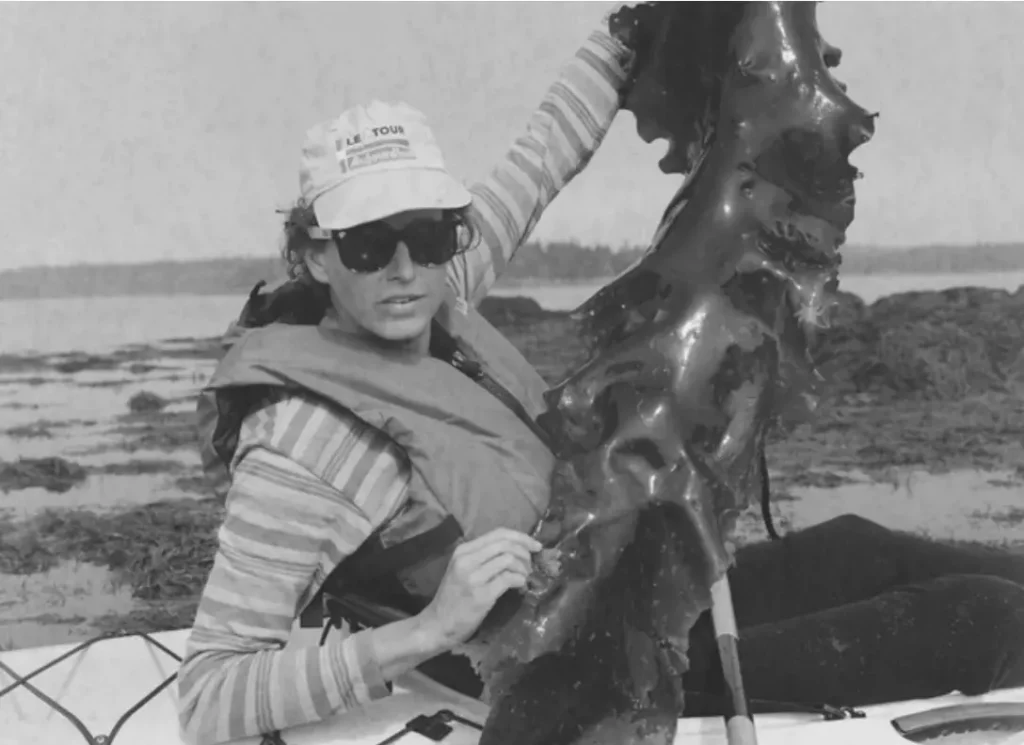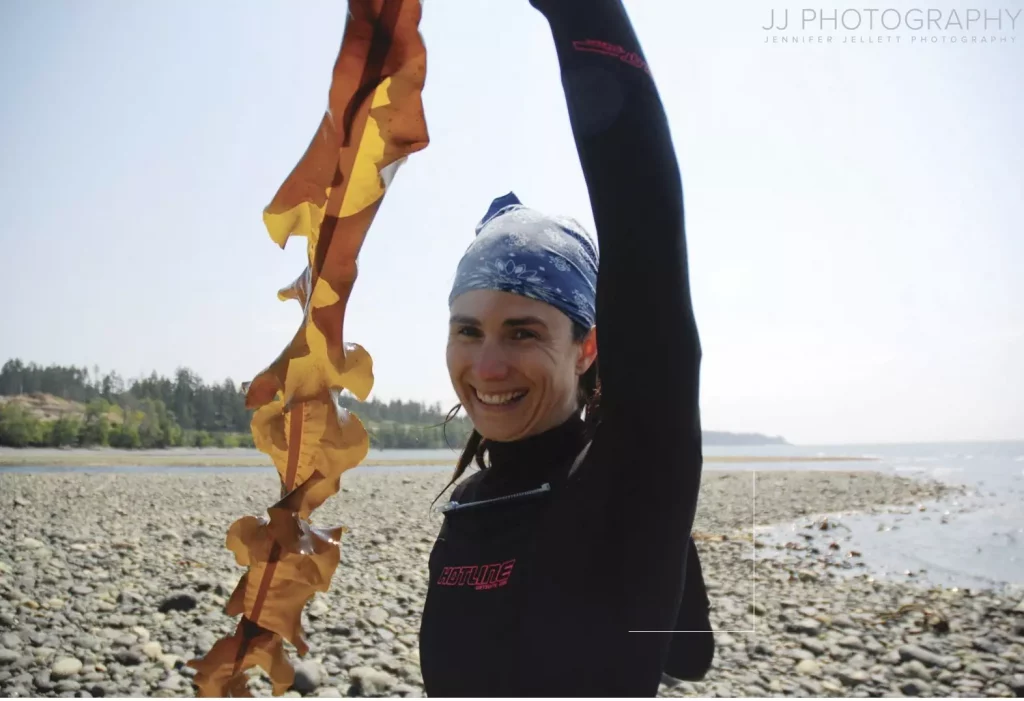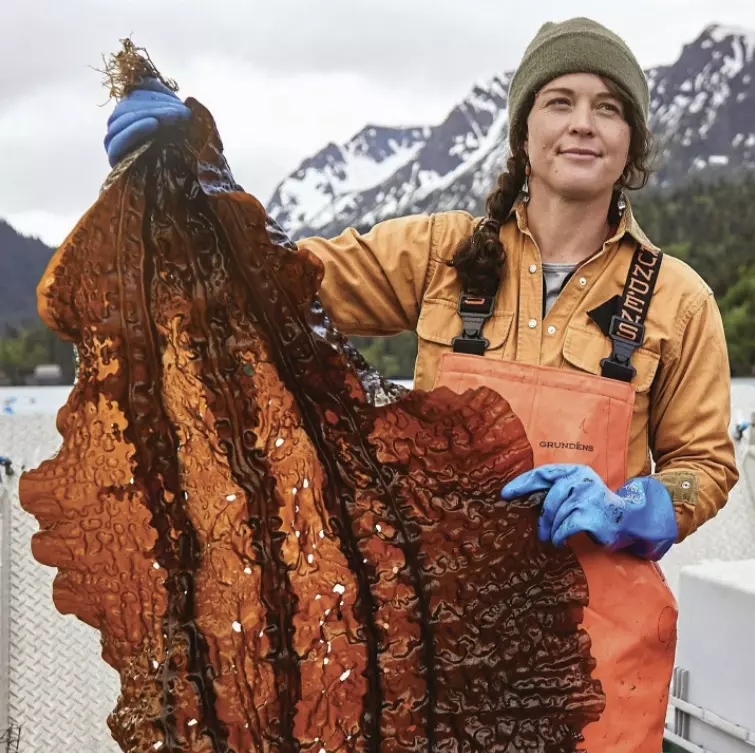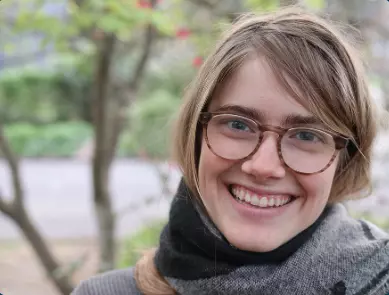Seaweed Commons seeks to form ecological seaweed coalitions, support and inform public discourse, increase algal literacy, and advocate for an appropriately scaled, just seaweed economy. By providing the public with nuanced and accessible information on the politics, ecology, governance, and economy of marine algae, we aim to promote an open and informed public discourse essential to responsible decision-making and resource management.
The current Seaweed Commons steering committee includes: Severine von Tscharner Welcome, Amanda Swinimer, and Avery Resor. With guidance from NAMA and Slow Fish, and with thanks and credit to Elena Bird and Sarah Holderman for their cooperation on the Seaweed Commons white paper.
People
Severine Welcome
is a farmer, activist, and organizer based in Downeast Maine. She and her husband Terran run Smithereen Farm, a MOFGA certified organic wild blueberry, seaweed, and orchard operation which hosts summer camps, camping, and educational workshops. Their springtime wild-harvest events—"Low Low Tides"—are open as an educational experience.
She is a founder and board member of Agrarian Trust, a commons based community land trust and current director of the Greenhorns, a 15 year old grassroots organization whose mission is to recruit, promote, and support the incoming generation of farmers in America. Severine brings her wide circle of allies and learnings from the world of young farmers movement into the wet realm of algae

Amanda Swinimer
is a seaweed harvester, author, business owner, and educator who lives and works on the west coast of Vancouver Island, Canada. She began her own business, Dakini Tidal Wilds, in 2003, hand-harvesting wild edible seaweed from the beaches and kelp forests surrounding her home. Swinimer’s unique expertise makes her a sought-after speaker at international conferences, speaking about the ecological importance of seaweeds and the extraordinary health benefits. She has been conducting seaweed workshops and tours as well as teaching young people in the British Columbia school system for years, passing on her rare knowledge and sharing her intensely joyful connection to the ocean with diverse audiences. She holds a BSc in marine biology and is the author of The Science and Spirit of Seaweed: Discovering Food, Medicine and Purpose in the Kelp Forests of the Pacific Northwest.

Avery Resor
is the Co-Founder/operator of Daybreak Seaweed Co. where she works with regenerative ocean farmers to bring seaweed into the everyday kitchen. For over 15 years, Avery has worked with farmers from the US to East Africa to bolster productivity, resilience, and food sovereignty. Avery studied marine biology at Duke University Marine Lab and earned a Master of Development Practice from UC Berkeley.

Sarah Holdeman
is a farmer and seaweed advocate who is delighted to join the Seaweed Commons network in imagining and advocating for diverse, resilient, locally determined seaweed economies. She also works to support equitable land tenure as Communications Specialist for the Agrarian Trust.

Collaborators in the Commons
- Paula Barbeito Morandeira - Slowfish International Coordinator
- Weatherly Bates - Shellfish and Kelp farmer, Alaska Shellfish Farms
- John Crofts - Fishmonger, Codfather’s Seafood Market; Slowfish Canada
- Terry d’Selkie - Seaweed Harvester, Ocean Harvest Seavegetable Company
- Brooke Fader - Slowfish Canada
- Kristina Long - Kelp farmer, Sea Forest
- Jim McIsaac - T. Buck Suzuki Foundation, Canadian Independent Fish Harvesters Federation
- Rowen Monks - Researcher, University of Victoria
- Colles Stowell - One Fish Foundation
We are always seeking others to learn from and with. If you are a seaweed harvester, farmer, researcher, or advocate at large, please join our listserv, register for an event, or reach out to be a part of our active network. If you have a lead you think we should be tracking or an article you want us to post, please send it to [email protected]
A project of the Greenhorns
For fifteen years, The Greenhorns have focused on cultural infrastructure for the incoming generation of organic farmers and ranchers. Our work has been to support young people entering the sector with education, training, networking, and acculturation into the life-world of the young farmers' movement. We engage with agroecology, food sovereignty, regional food-system, ecological restoration, traditional and adaptive management practices, cooperative legal structures, open-source farm tool innovations, and more. We produce books, films, media, and projects spanning these topics. www.greenhorns.org Just as The Greenhorns is concerned with the traditions, health, and future resilience of our agricultural landscapes and the peasants and family farmers who tend these places, so too are we concerned with the communities of the inter-tide and coastal ecology.
In the winter of 2022, a group of Seaweed Commons collaborators co-authored a position statement for the network. Please read our full position statement including case studies on aquaculture diseases and action calls for more rigorous research into the ecological, cultural, and regional economic implications of scaled-up seaweed production.
Seaweed Commons Position Paper: A precautionary approach to the seaweed aquaculture industry
Signatories
Amanda SwinimerSeverine Welcome
Avery Resor
Elena Bird
Sarah Holdeman
Kristina Long
Alexandra Morton
Terry D’Selkie
Louis Druehl
Nalani Kaneakua
John Fitzgerald
Abby Barrows
Weatherly Bates
Catherine O’Hare
Chuck Ramsey
Colles Stowell
Angela Willard
Jim McIsaac
John Crofts
Paula Barbeito Morandeira
Brook Fader
Paul Molyneaux
Rowen Monks
Michèle Mesmain
Catherine St. Germans
Sonia Strobel
Daria Allen
Dune Lankard
Alice Waters
Interested in joining as a signatory or collaborating in a working group to address specific objectives in our paper? Email [email protected]
Endangered Species Act Protection Sought for West Coast’s Bull Kelp
Center for Biological Diversity
September 2022
Commentary: Maine is already a world leader in seaweed aquaculture. The only way is up.
Portland Press Hearald
September 2022
“We don’t have an adequate regulatory framework in Maine to protect us from very large-scale experiments by very well-funded actors,” says Severine von Tscharner Fleming, a wild seaweed harvester and organic farming advocate with the North American group Seaweed Commons. Meanwhile, she says, there’s a lot of money and rhetoric from companies that large-scale projects will absorb carbon and produce copious food without any negative impacts. “It sounds a lot like the sunny, optimistic projections from conventional agriculture that those of us in organic ag have spent our lives trying to confront,” she says. “That over-rosy outlook is uncomfortable.”
>> Read more here
The first Seagriculture conference held in the United States, on September 6-7 in Portland, Maine, provided an optimistic view of a future where seaweed and underwater farming emerge as major contributors to food security, carbon management, and sustainable materials.
February 12, 2023
Maine’s cold water, abundant forests of rockweed and talented workforce make it a great place for seaweed aquaculture. That does not mean a ‘roadmap’ of headlong intensification is in the state’s best interest. The Dec. 6 article “Seaweed industry divided over concerns about pace of growth in Maine” presented Seaweed Commons and its first position paper as anti-aquaculture. I wish to clarify that position and raise the public visibility of aquaculture regulation.
Mushroom buoys could be contender in fight to reduce ocean plastics
The Bangor Daily News
April 19, 2022
Aquaculture and the Plastic Problem: Downeast Oyster and Kelp Growers Testing Alternative Gear
Edible Magazine, Maine
December 1, 2021
'All other life exists within their shelter': Irreplaceable Value of Maine's Rockweed Ecosystems
Maine Monitor
September 26, 2021

